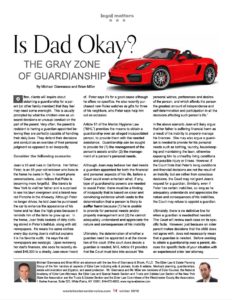IS DAD OKAY? THE GRAY ZONE OF ELDER GUARDIANSHIP
Often, clients will inquire about obtaining a guardianship for a parent (or other family member) that they feel may need some oversight. This is usually prompted by what the children view as unsound decisions or unusual conduct on the part of the parent Very often, the parent is resistant to having a guardian appointed believing they are perfectly capable of handling their daily lives. They defend their decisions and conduct as an exercise of their personal judgment as opposed to an incapacity.
Consider the following scenario:
Joan is 55 and lives in California. Her father, Peter, is an 85-year-old widower who lives in the home he owns in Rye. In recent phone conversations, Joan notices that Peter is becoming more forgetful. She travels to New York to visit her father and is surprised to see his lawn overgrown and a brand new red Porsche in the driveway. Although Peter no longer drives, he told Joan he purchased the car to enhance the appearance of his home and he likes the high grass because it reminds him of the farm he grew up on. In the home, Joan finds baskets of dirty clothing stored in Peter’s bathtub, along with old newspapers. Peter wears the same clothes every day during Joan’s visit but explains it is his favorite outfit. He says the old newspapers are nostalgic. Upon reviewing Peter’s finances, she sees he recently donated $45,000 to a charity Joan never heard of. Peter says it’s for a good cause although he offers no specifics. Peter also recently purchased new Rolex watches as gifts for three of his neighbors, who Peter says help him out on occasion.
Article 81 of the Mental Hygiene Law (“MHL”) provides the means to obtain a guardianship over an alleged incapacitated person, to provide them with the needed assistance. Guardianship can be sought to provide for (1) the management of the person’s assets and/or (2) the management of a person’s personal needs.
Although Joan may believe Peter needs a guardian appointed for both the financial and personal aspects of his life, before a Court could even entertain what, if any, type of guardianship powers are needed to assist Peter, there must be a finding of incapacity that is based on clear and convincing evidence which leads to the determination that a person is likely to suffer harm because (1) he is unable to provide for personal needs and/or property management and (2) he cannot adequately understand and appreciate the nature and consequences of his inability.
Ultimately, the determination of whether a guardian need be appointed is at the discretion of the court. If the court does decide a guardian is needed, MHL Article 81 provides that the Court must take into account “the personal wishes, preferences and desires of the person, and which affords the person the greatest amount of independence and self-determination and participation in all the decisions affecting such person’s life.”
In the above scenario Joan will likely argue that Peter is suffering financial harm as a result of his inability to properly manage his finances. She may also argue a guardian is needed to provide for Peter’s personal needs such as bathing, laundry, housekeeping and maintaining the lawn, otherwise exposing him to unhealthy living conditions and possible injury or illness. However, if the Court finds that Peter’s living conditions and financial decisions are not the result of an inability, but are rather from conscious decisions, the Court may not grant Joan’s request for a guardian. Similarly, even if Peter has certain inabilities, so long as Peter adequately understands and appreciates the nature and consequences of his inabilities, the Court may refuse to appoint a guardian.
Ultimately, there is no definitive line for when a guardian is needed/not needed. The Court will review each case on its specific facts. However, just because an elderly parent makes decisions that the child does not agree with, does not necessarily mean that a guardian is needed. Before seeking to obtain a guardianship over a parent, discuss the specific facts of your situation with an experienced elder law attorney.
As published in Westchester Senior Voice – Winter 2016

